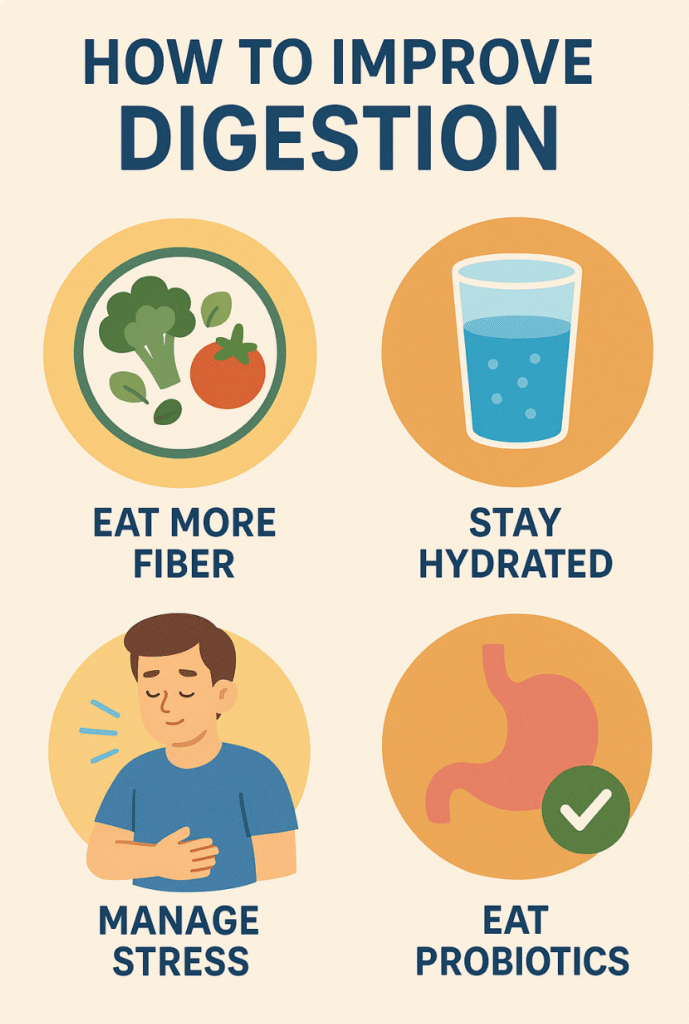Digestive health is central to overall wellness, yet it is often overlooked until problems arise. The digestive system is responsible for breaking down food, absorbing nutrients, and eliminating waste. When it functions properly, energy levels, immunity, and even mental health improve. However, modern diets, stress, and sedentary lifestyles can negatively impact gut health, leading to bloating, constipation, acid reflux, and long-term gastrointestinal issues.
Why Digestive Health Matters
The digestive system is connected to nearly every aspect of health. Scientific research shows that:
- A balanced gut microbiome boosts immunity.
- Digestive efficiency impacts weight management.
- Poor digestion can influence mood and mental health through the gut-brain axis.
- Chronic digestive problems increase the risk of conditions such as irritable bowel syndrome (IBS), ulcers, and even colon cancer.
Maintaining digestive wellness is not only about avoiding discomfort but also about building long-term resilience for the entire body.
Key Strategies to Improve Digestion
1. Eat More Fiber
Fiber is crucial for digestive function. Soluble fiber (found in oats, beans, and fruits) helps regulate blood sugar and cholesterol, while insoluble fiber (whole grains, vegetables) adds bulk to stools and prevents constipation. Aim for 25–35 grams of fiber daily.
2. Stay Hydrated
Water aids digestion by breaking down food and moving it smoothly through the intestines. Dehydration is a common cause of constipation. Experts recommend 8–10 cups of water daily, with higher intake for active individuals.
3. Manage Stress
Stress directly affects digestion by slowing gastric emptying or increasing stomach acid, which can cause indigestion or heartburn. Practices like meditation, yoga, and deep breathing can regulate stress hormones, improving digestion.
4. Eat Probiotics and Prebiotics
Probiotics (found in yogurt, kefir, sauerkraut) introduce beneficial bacteria into the gut, while prebiotics (bananas, garlic, onions) feed them. Together, they create a healthy microbiome that reduces inflammation and supports immunity.
5. Practice Mindful Eating
Chewing food thoroughly and eating slowly helps enzymes in saliva start the digestive process, reducing bloating and enhancing nutrient absorption. Avoid overeating, which strains the stomach and intestines.
6. Exercise Regularly
Physical activity stimulates intestinal contractions, reducing constipation risk. Even 30 minutes of walking daily can significantly improve digestion.
Foods to Support Digestive Health
- Best choices: leafy greens, fermented foods, whole grains, lean proteins, herbal teas.
- Foods to limit: processed foods, high sugar snacks, fried foods, and excessive caffeine or alcohol.
For detailed recommendations, see Mayo Clinic Digestive Health.
Conclusion
A healthy digestive system is the foundation of overall wellness. By focusing on diet, hydration, stress management, and lifestyle habits, anyone can support long-term gut function and avoid common gastrointestinal problems. Remember: small, consistent changes make the greatest difference.
🇰🇷 Premium Korean Ginseng Online Shop







